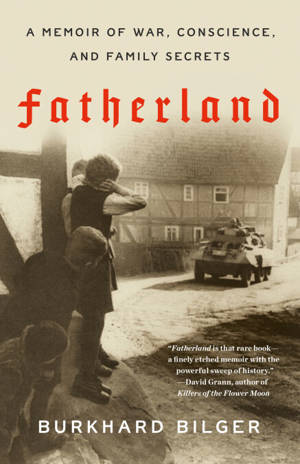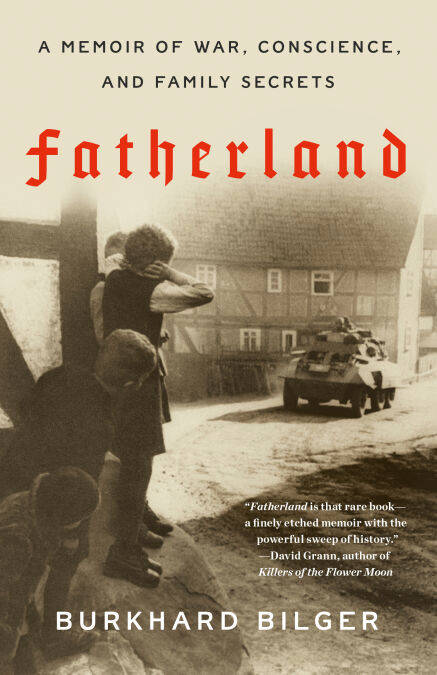
- Retrait gratuit dans votre magasin Club
- 7.000.000 titres dans notre catalogue
- Payer en toute sécurité
- Toujours un magasin près de chez vous
- Retrait gratuit dans votre magasin Club
- 7.000.0000 titres dans notre catalogue
- Payer en toute sécurité
- Toujours un magasin près de chez vous
15,56 €
+ 15 points
Format
Description
A New Yorker staff writer investigates his grandfather, a Nazi Party Chief, in “a finely etched memoir with the powerful sweep of history” (David Grann, #1 bestselling author of Killers of the Flower Moon)
“Fatherland maintains the momentum of the best mysteries and a commendable balance.”—The New York Times
“Unflinching and illuminating . . . Bilger’s haunting memoir reminds us, the past is prologue to who we are, as well as who we choose to be.”—The Wall Street Journal
A BEST BOOK OF THE YEAR: The New Yorker, The Washington Post, Kirkus Reviews
One spring day in northeastern France, Burkhard Bilger’s mother went to the town of Bartenheim, where her father was posted during the Second World War. As a historian, she had spent years studying the German occupation of France, yet she had never dared to investigate her own family’s role in it. She knew only that her father was a schoolteacher who was sent to Bartenheim in 1940 and ordered to reeducate its children—to turn them into proper Germans, as Hitler demanded. Two years later, he became the town’s Nazi Party chief.
There was little left from her father’s era by the time she visited. But on her way back to her car, she noticed an old man walking nearby. He looked about the same age her father would have been if he was still alive. She hurried over to introduce herself and told him her father’s name, Karl Gönner. “Do you happen to remember him?” she said. The man stared at her, dumbstruck. “Well, of course!” he said. “I saved his life, didn’t I?”
Fatherland is the story behind that story—the riveting account of Bilger’s nearly ten-year quest to uncover the truth about his grandfather. Was he guilty or innocent, a war criminal or a man who risked his life to shield the villagers? Long admired for his profiles in The New Yorker, Bilger brings the same open-hearted curiosity to his family history and the questions it raises: What do we owe the past? How can we make peace with it without perpetuating its wrongs?
“Fatherland maintains the momentum of the best mysteries and a commendable balance.”—The New York Times
“Unflinching and illuminating . . . Bilger’s haunting memoir reminds us, the past is prologue to who we are, as well as who we choose to be.”—The Wall Street Journal
A BEST BOOK OF THE YEAR: The New Yorker, The Washington Post, Kirkus Reviews
One spring day in northeastern France, Burkhard Bilger’s mother went to the town of Bartenheim, where her father was posted during the Second World War. As a historian, she had spent years studying the German occupation of France, yet she had never dared to investigate her own family’s role in it. She knew only that her father was a schoolteacher who was sent to Bartenheim in 1940 and ordered to reeducate its children—to turn them into proper Germans, as Hitler demanded. Two years later, he became the town’s Nazi Party chief.
There was little left from her father’s era by the time she visited. But on her way back to her car, she noticed an old man walking nearby. He looked about the same age her father would have been if he was still alive. She hurried over to introduce herself and told him her father’s name, Karl Gönner. “Do you happen to remember him?” she said. The man stared at her, dumbstruck. “Well, of course!” he said. “I saved his life, didn’t I?”
Fatherland is the story behind that story—the riveting account of Bilger’s nearly ten-year quest to uncover the truth about his grandfather. Was he guilty or innocent, a war criminal or a man who risked his life to shield the villagers? Long admired for his profiles in The New Yorker, Bilger brings the same open-hearted curiosity to his family history and the questions it raises: What do we owe the past? How can we make peace with it without perpetuating its wrongs?
Spécifications
Parties prenantes
- Auteur(s) :
- Editeur:
Contenu
- Nombre de pages :
- 336
- Langue:
- Anglais
Caractéristiques
- EAN:
- 9780385353991
- Date de parution :
- 01-05-23
- Format:
- Ebook
- Protection digitale:
- Adobe DRM
- Format numérique:
- ePub

Les avis
Nous publions uniquement les avis qui respectent les conditions requises. Consultez nos conditions pour les avis.






